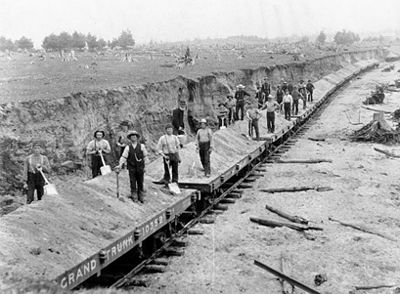The major transformations that have occurred in trade between countries have caused major changes in the way that the various social actors organize to express their views and defend their interests.
The major transformations that have occurred in trade between countries have caused major changes in the way that the various social actors organize to express their views and defend their interests. In particular, globalization of the economy has caused labour unions to start asking themselves some questions that had never been raised since the 19th-century industrial revolution, when men and women first understood how necessary and important it was to take collective action to improve their working conditions and resist domination by their employers.
Ever since, labour unions had established their lines of defence in the workplace, be it a manufacturing plant, a construction site or the offices of an institution. Because each such workplace generally operated with a fair degree of autonomy, it made sense for workers to define their strategies according to the site where decisions were normally made and where those that could have negative impacts on workers’ lives could be stopped.
But today, the fundamental trend toward globalization and internationalization, with an accompanying diminution of the role of the workplace in decision-making, seems irreversible. Unfortunately, this trend is even accelerating, thus strengthening the speculative financial sector’s grip on all economic activity. All of these developments have completely disrupted workers’ traditional methods of asserting their rights.
Labour organizations in Western countries have reacted to this new situation in a variety of ways. Almost all of these organizations agree that they must fight the globalization of markets, because it represents an extreme form of capitalism, with an underlying logic that ultimately concentrates power in a way that no social forces can oppose.
However, labour organizations also show some differences in their attitudes toward globalization. When this trend first emerged, all unions agreed that it had to be fought. For example, when Canadian labour unions were excluded from the talks on NAFTA, they refused to sanction this new way of organizing trade between countries. Many Canadian labour unions still take an essentially defensive, protectionist attitude on this subject, while others continue to reject all forms of international agreements.
But Québec unions in particular have taken a somewhat different approach. Recognizing that the trend toward globalization appears irreversible, they have gone on the offensive and demanded that trade agreements include social clauses to protect workers’ rights within the new economic landscape. In this regard, Québec unions have been inspired by the position that European unions took in the negotiations on the Maastricht Treaty, which resulted in its including some important social-protection measures.
Globalization of markets has forced the union movement to recognize the importance of organizing its actions on a planetary scale. Thus, the International Confederation of Free Trade Unions (ICFTU), whose membership increased substantially after the breakup of the Soviet bloc, now plays a leading role in this regard. The Canadian Labour Congress is affiliated with the ICFTU, and Québec’s confederation of trade unions, the Confédération des syndicats nationaux, joined the ICFTU in 1998.

 Share on Facebook
Share on Facebook Share on X
Share on X Share by Email
Share by Email Share on Google Classroom
Share on Google Classroom




